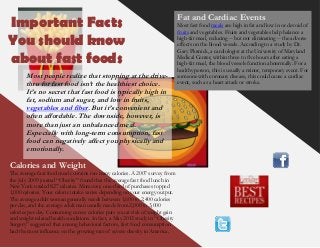
Important facts you should know about fast foods
- 1. Important Facts You should know about fast foods Calories and Weight The average fast food meal contains too many calories. A 2007 survey from the July 2009 journal “Obesity” found that the average fast food lunch in New York totaled 827 calories. Moreover, one-third of purchases topped 1,000 calories. Your caloric intake varies depending on your energy output. The average adult woman generally needs between 1,600 to 2,400 calories per day, and the average adult man usually needs from 2,000 to 3,000 calories per day. Consuming excess calories puts you at risk of weight gain and weight-related health conditions. In fact, a May 2012 study in “Obesity Surgery” suggested that among behavioral factors, fast food consumption had the most influence on the growing rate of severe obesity in America. Most people realize that stopping at the drive- thru for fast food isn’t the healthiest choice. It’s no secret that fast food is typically high in fat, sodium and sugar, and low in fruits, vegetables and fiber. But it’s convenient and often affordable. The downside, however, is more than just an unbalanced meal. Especially with long-term consumption, fast food can negatively affect you physically and emotionally. Fat and Cardiac Events Most fast food meals are high in fat and low in or devoid of fruits and vegetables. Fruits and vegetables help balance a high-fat meal, reducing -- but not eliminating -- the adverse effects on the blood vessels. According to a study by Dr. Gary Plotnick, a cardiologist at the University of Maryland Medical Center, within three to five hours after eating a high-fat meal, the blood vessels function abnormally. For a healthy person, this is usually a minor, temporary event. For someone with coronary disease, this could cause a cardiac event, such as a heart attack or stroke.
